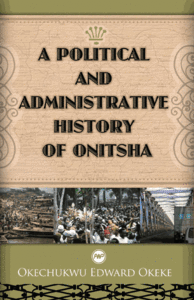Categories
Categories
Authors
Authors
A POLITICAL AND ADMINISTRATIVE HISTORY OF ONITSHA 1917-1970, by Okechukwu Edward Okeke
A POLITICAL AND ADMINISTRATIVE HISTORY OF ONITSHA 1917-1970, by Okechukwu Edward Okeke
Product Description
Located on the eastern bank of the lower Niger, Onitsha is one of the leading commercial cities and road transport hubs in Nigeria. Its main market is reputed to be the biggest in West Africa. Founded well before the twentieth century by an Igbo community, it is also predominantly Igbo in population. For a greater part of the twentieth century, up to the late 1950s, it was the leading educational center in southeastern Nigeria. During this period, it spawned a large volume of fictional tracts written by junior clerks and barely literate traders, the body of which is called “Onitsha Market Literature.”
A Political and Administrative History of Onitsha is an in-depth study of the political and administrative history of Onitsha from 1917 (the year it officially became an urban area) to 1970 (the year the Nigerian civil war ended). The book engages the literature on Onitsha and, generally, on urban history in colonial Nigeria. But it is based mainly on primary sources, archival and oral, predominantly the former. It treats the following issues: political conflicts among the indigenes of Onitsha; political conflicts between the indigenes of Onitsha and the non-Onitsha Igbo residents of the city; and administrative policies. The book also shows how the administrative policies adopted in Onitsha, and the intragroup and intergroup political conflicts mentioned above, affected the city’s development as a modern urban center.
The author establishes that even though traditional political office holders lost a great deal of their power from the time Onitsha was brought under the colonial state of Nigeria, traditional chieftaincy positions remained prestigious and were fiercely competed for by the indigenes of the city. He demonstrates that the political conflicts between the city’s indigenes and the non-Onitsha Igbo arose mainly from disagreements over the right to control the city’s local government council. He also shows how the ill feelings generated by the latter set of conflicts in the pre-civil war period in Nigeria inclined the non-Onitsha Igbo to harass and in other ways victimize the indigenes of Onitsha during the civil war. The author further shows how the administrative policies adopted by the colonial government enabled Onitsha to acquire the infrastructural and institutional features of a modern urban area and also enabled its Nigerian residents to increasingly assume more powers over its affairs. However, the author also shows how the overall development of the city was adversely affected by wrongheaded local government policies, inexperience, and corruption, due mainly to the pattern of its political conflicts.
ABOUT THE AUTHOR
OKECHUKWU EDWARD OKEKE is Head of the Department of History and International Relations at Abia State University, Uturu, Nigeria. He holds a PhD in History (UNN). His specialty is the political and administrative history of twentieth-century Nigeria. Issues of special interest to him include intergroup relations, local government policy, and revenue allocation. He has authored two books, several book chapters, and articles and reviews in Nigerian and international journals, including Journal of Religion in Africa, Journal of Urban History, and African Studies Quarterly
CATEGORY
History, Urban Studies/AFRICA
 Loading... Please wait...
Loading... Please wait... 


